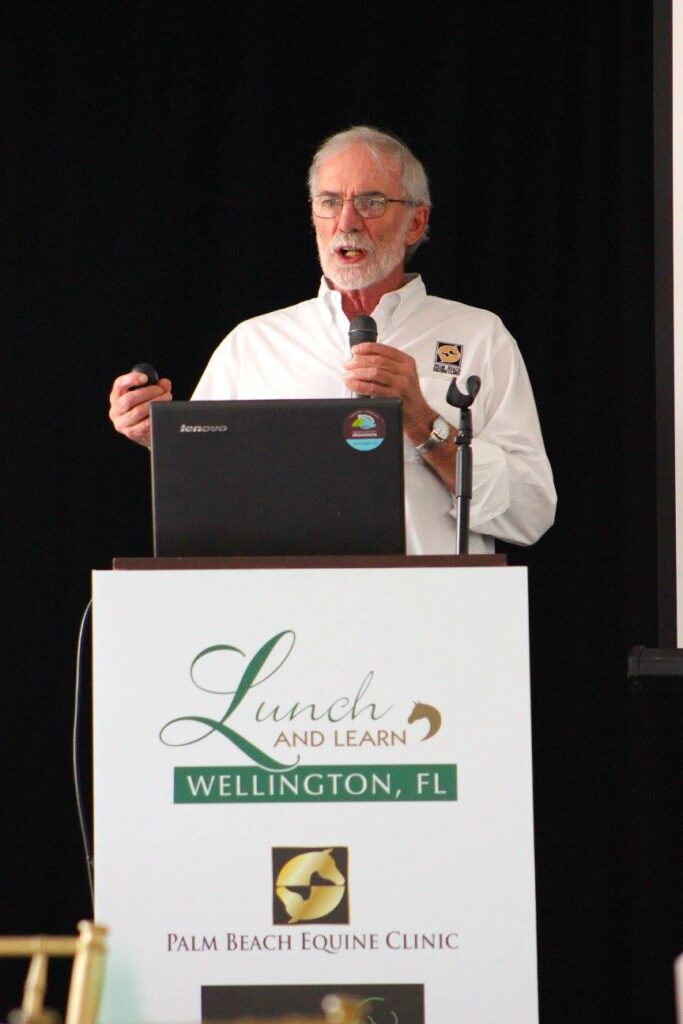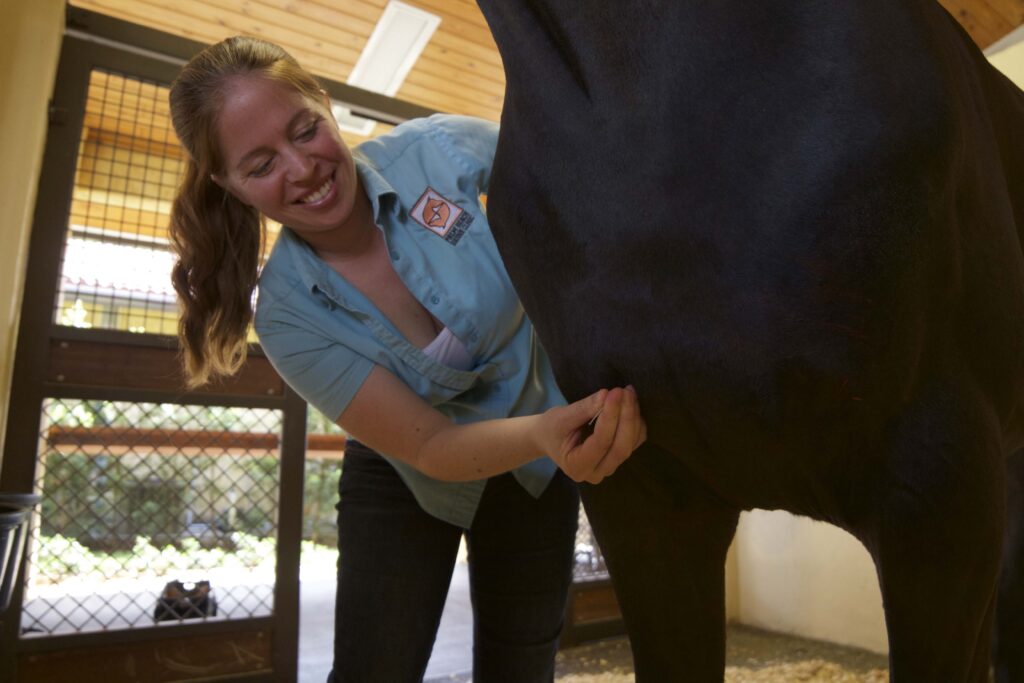Category: Medical
Foot soreness, especially for jumpers, become more noticeable as the winter equestrian season winds down in Florida, according to well-respected veterinarian and farrier Dr. Stephen O’Grady of Palm Beach Equine Clinic.

Foot Soreness Issues Surfacing Toward the End of Winter Competition Season
Dr. O’Grady has been treating horses for 45 years across the country. He also travels extensively all over the world, teaching and training other veterinarians and farriers on therapeutic farriery solutions. It’s obvious to Dr. O’Grady why foot soreness and problems are more common later in the horse show season.
“When horses arrive in Wellington, Florida, in December, foot care starts with bar shoes, pads, pour-ins, etc. as a form of prevention for the busy three months. Perhaps it would be more appropriate to start the competition season by doing a conservative trim, leave horn on the bottom of the foot, and make sure the proper size shoe is selected. The various farrier products may actually add pressure to the structures in the beginning of the season” says Dr. O’Grady.
“When it comes around to March, the structures of the foot have been compromised by the intensity of the competition schedule. The protective farrier products have already been used and there’s nothing more to absorb the shock and energy at the end of the season.”
Preventing Foot Soreness in Competition Horses
Dr. O’Grady adds that it is okay to use different medications and anti-inflammatories as long as the proper dosages and rules are followed as prescribed. But to properly fix foot problems, he has one sure solution.
“Time is the best cure,” Dr. O’Grady says. “The feet are the slowest structures on the horse to recover. There isn’t a magical fix.”
However, Dr. O’Grady has an idea that might help if you cannot give your horse sufficient rest despite the numerous classes and repetitive nature of the show schedule.
As the season wears on, whether it’s WEF or HITS, Dr. O’Grady believes that decreasing the amount of warm up, schooling and lunging makes a world of difference in protecting the hooves.
“But if the feet are sore, the feet are sore,” adds Dr. O’Grady. “There’s no quick fix. It’s all about prevention.”
Snowballing Effects of Foot Soreness
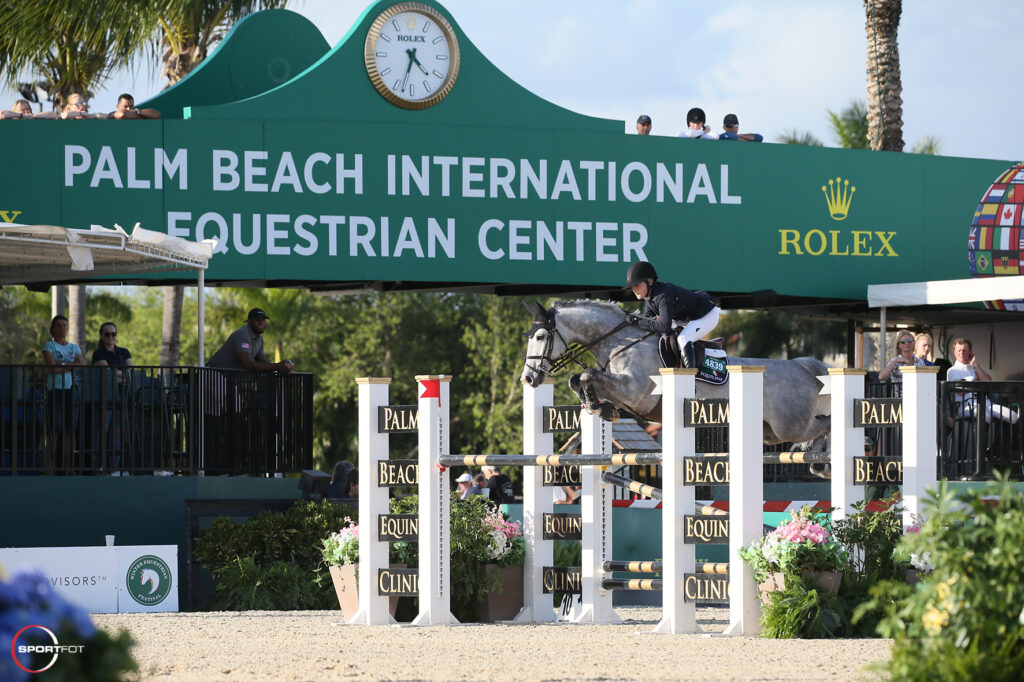
Sore feet can cause numerous problems elsewhere, according to Dr. Robert Brusie, head surgeon at Palm Beach Equine Clinic.
“The horses with sore feet tend to land funny, which can cause strained suspension ligaments or tendons,” says Dr. Brusie. “There also could be sore heels. Sore feet tend to make them short-strided and that could lead to a sore back and or a sore neck.”
Dr. Brusie says one way to notice a horse with sore feet, especially among jumpers, is their reluctance to jump the fences.
“That can be hard on the riders, too,” adds Dr. Brusie.
The foot is the closest to the environment and if you have a sore-footed horse, it could lead to lameness and poor performance, according to Dr. Brusie. Another possibility that could lead to sore feet is being too wet.
“Horses that are to show or play (polo) sometimes get two or three baths a day,” explains Dr. Brusie. Coupled with rings that are sprayed with water to help the footing can lead to problems, he said.
Both Dr. O’Grady and Dr. Brusie believe that taking proper care of your horse’s feet early helps the horses in the long run by eliminating other problems.

For over 30 years, Palm Beach Equine Clinic (PBEC) has offered an unwavering commitment to the care of your horse, whether an Olympic athlete or reliable trail horse. PBEC’s goal is to keep your horse healthy and happy while extending their performance career. PBEC offers innovative veterinary services with the assistance of state-of-the-art diagnostic tools and surgical equipment. They also offer several equine alternative therapies that can optimize your horse’s health and increase the longevity of their career.
Veterinary chiropractic manipulation, acupuncture, and Chinese herbal medicine are three alternatives to standard medical treatments offered at PBEC.
While all of PBEC’s 28 veterinarians are versed in all methodologies of equine medicine, several of the doctors have studied extensively in equine alternative therapies. Dr. Natalia Novoa treats horses with chiropractic manipulation and acupuncture. Dr. Janet Greenfield-Davis focuses specifically in acupuncture treatment and also uses Chinese herbal medicine to bring out the best in her patients.
PBEC’s Dr. Richard Wheeler spoke of how equine alternative medicine can be used to improve your horse’s chance for success and treat many different issues.
Alternative Therapies for Performance Horses
“The line between success and failure is very thin for performance horses, and a lot of these alternative therapies can be very useful to give the horse that little bit more,” Dr. Wheeler explained. “Chiropractic manipulation and acupuncture are two alternative therapies that we offer. They are both conjunctive therapies that can keep horses comfortable, happy and performing well.”


“Both chiropractic manipulation and acupuncture can get the horse moving a little bit better and can help to maintain some minor chronic problems that they may have, therefore avoiding more invasive treatments,” Dr. Wheeler continued. “For neck or back pain, once we diagnose a problem, we may treat it and then follow up with a program of equine alternative therapies. These therapies are used with the aim of keeping the horse supple, and moving with ease, and helping the musculature to work correctly. We work with the trainers to optimize muscle development so that we can fix the problem and keep the horse moving forward and performing at the top level.”
Equine Acupuncture
Dr. Janet Greenfield-Davis is one of the veterinarians at PBEC that is skilled in acupuncture and herbal medicine. Acupuncture is a form of treatment used in both traditional and classical Chinese medicine. It is based on the principle that there are energetic pathways, or channels, throughout the body that influence associated internal organs and structures. Energy from these pathways surface at various points on the body, identified as acupuncture points. Extremely fine gauge needles are inserted at selected points, stimulating these points and thereby activating the body’s natural healing abilities.
“We offer acupuncture, chiropractic and herbal medicine as an alternative or adjunct therapy to your current veterinary protocol,” Dr. Greenfield-Davis explained. “With acupuncture, we stimulate particular points that can relieve pain, increase endorphins, calm, and improve health and body function in horses. These specific points have a high capacity of nerve endings, lymphatic vessels, and blood vessels, as well as hormone stimulation.”
Clinical trials indicate that acupuncture may be an effective adjunct therapy for musculoskeletal problems, such as muscle soreness, back pain, disc problems, osteoarthritis, and degenerative joint disease. Acupuncture may help neurological disorders, such as laryngeal hemiplegia, and facial and radial nerve paralysis. It can help with gastrointestinal disorders, such as diarrhea, gastric ulcers, colic, and impaction. Acupuncture may also help with respiratory diseases, metabolic and endocrine diseases, and other chronic conditions, such as anhidrosis, heaves, asthma, cough, uveitis, and behavioral problems.
Equine alternative therapies such as acupuncture and chiropractic manipulation have gained popularity over the past years. Offering these therapies allows PBEC to treat horses in other ways in addition to their standard practices of equine medicine. Dr. Natalia Novoa is one of the veterinarians at PBEC who offers both chiropractic and acupuncture therapies for clients.
Veterinary Chiropractic Manipulation
“Chiropractic is an excellent complementary modality that can be used for diagnosis, treatment, and prevention of selected neuromusculoskeletal disorders,” Dr. Novoa explained. “The practice of chiropractic focuses on the relationship between structure (primary spinal column) and function (coordinated by the nervous system) to restore it. The goal is to treat soft tissue injuries or articular dysfunction to optimize health through manual therapy and to detect and treat abnormalities and alleviate pain.”


Veterinary chiropractic manipulation is thought to optimize equine health by restoring the normal joint motion, reversing mild pathology, and helping to slow the progression of degenerative joint and spine disease. Over the years, this therapy has become a valuable adjunct for competition horses.
Chiropractic manipulation is also a great treatment option for horses that suffer neck and back pain, nerve damage, poor performance, behavioral problems, muscle spasms, localized or regional joint stiffness, unexplained lameness, gait abnormalities asymmetry/muscle imbalance/atrophy, injuries resulting from falls, trauma (such as slips, getting cast in the stall, or missteps), or poor fitting equipment.
“I identify the restricted movement or subluxations by manipulating and evaluating the joint mobilization. Then I restore the joint motion with an adjustment which is a manual controlled force applied to a specific joint,” Dr. Novoa said of the process.
Complementary Sport Horse Medicine
Chiropractic and acupuncture therapies are complementary treatments for lameness problems and other issue. They are alternative methods and do not replace conventional veterinary medicine or surgery, but can be very useful in maintaining top performance levels in your horse.
“There has been an increase of interest in non-traditional therapy, and PBEC is aware of its great value, so we provide the services to allow our horses to reach maximum performance potential and overall health,” Dr. Novoa concluded.
Palm Beach Equine Clinic provides experience, knowledge, availability, and the very best care for the horses of Wellington. Have them be a part of your team! To find out more, please visit www.EquineClinic.com or call 561-793-1599.
Palm Beach Equine Clinic’s Dr. Richard Wheeler recently shared the basic steps he takes in performing an equine pre-purchase exam.
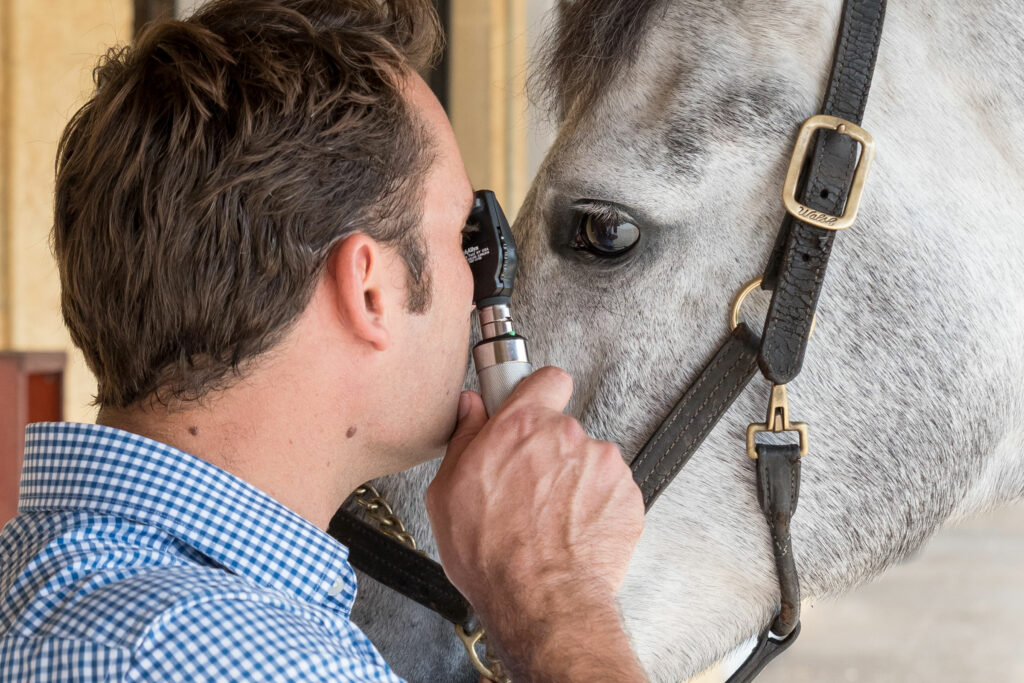
Dr. Wheeler and PBEC’s 28 veterinarians, including Board Certified surgeons, a internal medicine specialist and a radiologist, are considered some of the most experienced in treating equine athletes from all disciplines. Palm Beach Equine Clinic veterinarians enjoy the opportunity of working with top horses and riders at their home base in Wellington, FL, and through satellite services at competitions around the world.
With thousands of horses competing in Wellington at events such as the Winter Equestrian Festival and the Adequan® Global Dressage Festival, equine sales are a huge factor of equestrian businesses. Palm Beach Equine Clinic’s pre-purchase examination services are always available to assist in making the best decision on your next equine purchase.
No matter what the breed or discipline, pre-purchase exams include several basic initial steps. First, an overall health evaluation of the horse is completed, including previous health history, general condition, and conformation. The veterinarian examines specific body systems including the eyes, cardiovascular system and respiratory system.
Next, a lameness assessment is completed, including flexion tests, soft tissue structure palpation, and movement evaluation. Additional diagnostic imaging such as radiographs (x-rays), ultrasound, endoscopy, magnetic resonance imaging (MRI), or nuclear scintigraphy (bone scans) may be requested for additional information.
The goal of a pre-purchase exam is to assess its current state of the horse’s health and soundness at that time of the examination. Pre-purchase exams allow veterinarians to gather information that may help the owner and veterinarian predict a level of risk for the future use of the horse.
Steps Taken in a Pre-Purchase Exam
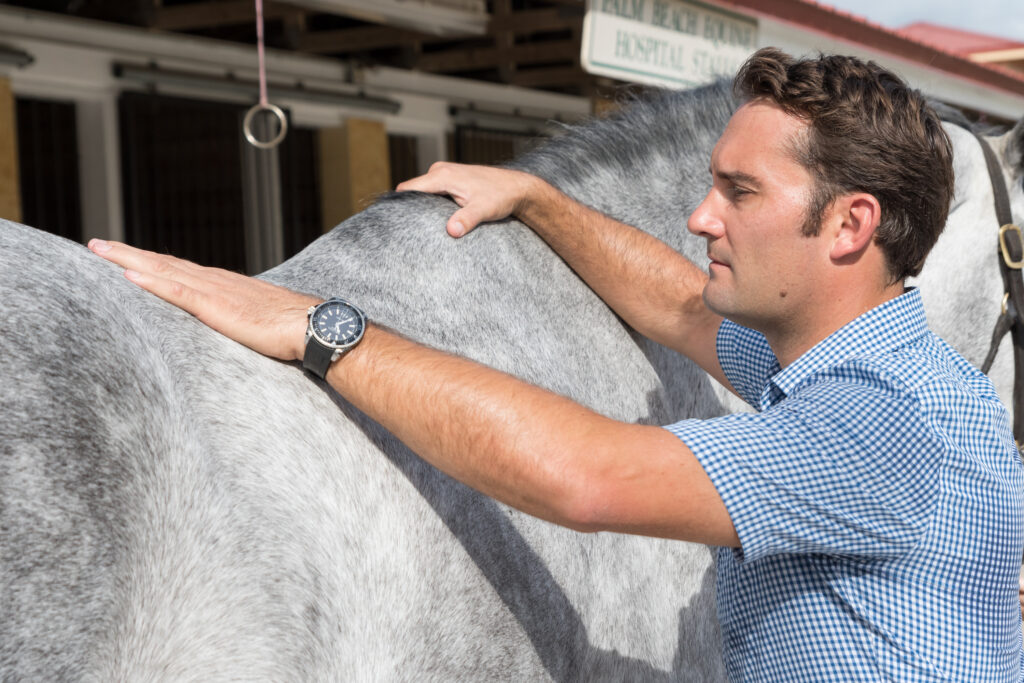
- “The first thing I do is talk to the potential buyer and trainer to gather their expectations and any concerns that have arisen during the trial of the horse. Next I discuss the horse with the current owner and/or trainer to determine what level of training or competition it is in, and if it has any previous issues that they are dealing with.”
- “Then we look at the horse in a static exam in the stall. We do a physical exam, looking at the whole body from front to back. Key points are the eyes, heart, and lungs and we palpate from the head and neck, to the back, and down the limbs. We are looking for signs of old injuries or areas that may have issues; conformation comes into play here as well.”
- “We want to look at the horse in a dynamic exam. We usually look at it on the lead line and on a lunge line, or trotting in a circle on hard and soft surfaces, and then also under saddle as well. I like to see all of my horses go under saddle because we can observe the interaction of horse and rider, which is very important. During this stage we will perform flexion tests and ask the horse to perform specific movements depending on the discipline.”
- Blood tests are often taken and normally will include CBC, Chemistry, Coggins test and a drug screen. Depending of the age or type of horse other tests may be performed.
- “Finally, there are some auxiliary tests, which may include radiographs, ultrasound exams, and endoscopy of the upper airways. These days, if there are certain issues, we will also include further diagnostic tests such as MRIs or bone scans. That depends on what is found in other parts of the exam. If there is something suspicious on a radiograph, the buyer might want to do more advanced imaging. Or sometimes, depending on the value of the horse, they might want to do that anyway.”
A Comprehensive Profile of the Horse
Dr. Wheeler pointed out that it is not the intention of a pre-purchase exam to recommend the horse for purchase or for sale. The exam is performed to provide information about the level of risk and educate the client of that risk. The client will make the decision on whether they want to buy the horse or not based on the information the veterinarian has provided as well as information from their trainer.
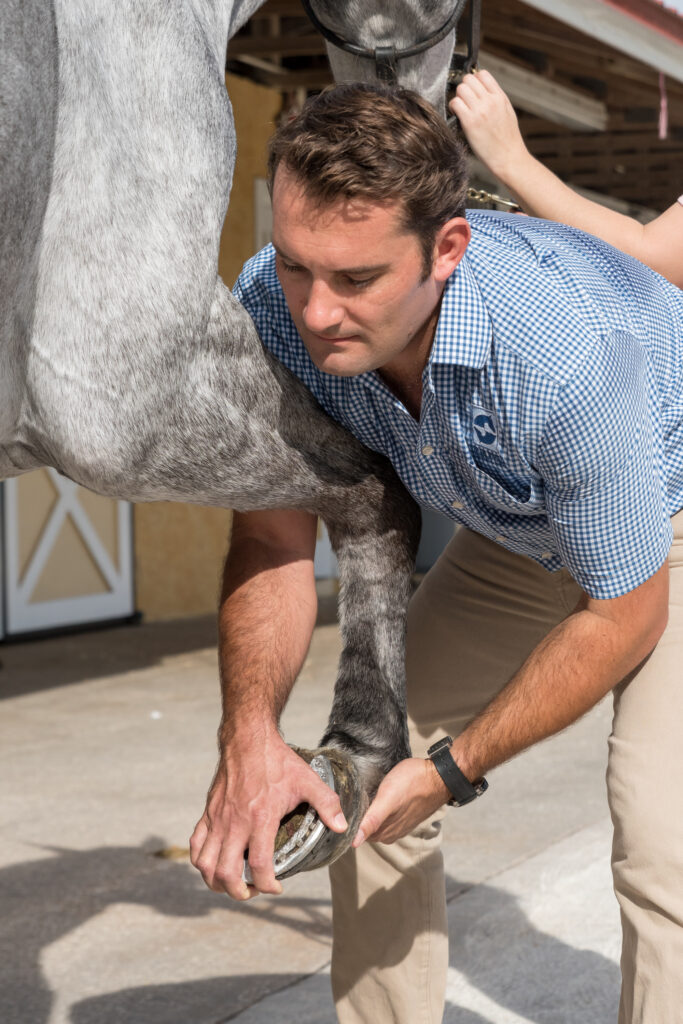
“What might be acceptable for you may not be for me, or vice versa, depending on what I want the horse for or the value of the horse,” Dr. Wheeler noted.
“It is not a pass/fail situation. We are just describing the horse, doing our best to state whether the issues that it has can be maintained or can be useful for the horse’s given profession, and what is expected of it, and this is where experience is so important. If the horse is being purchased as a low level children’s show horse, the stresses on it are going to be less than if it is being asked to go to the Olympics.”
Every exam is different, but the basic steps of evaluating a horse for any discipline or level of competition are fairly standard. It is important to have a veterinarian who is experienced and knowledgeable with the specific discipline to provide accurate guidance on the horse’s condition for the expected job. For the clientele of Palm Beach Equine Clinic, the veterinarians are all well-schooled in the different disciplines, and many have additional expertise in specific areas.
The world-renowned veterinarians of PBEC will be sharing their expertise on equine pre-purchase exams in a four-part series featured exclusively on ProEquest from February through April 2016. Located in the heart of Wellington, FL, Palm Beach Equine Clinic serves multi-discipline clientele at equestrian competitions throughout North America and abroad. To schedule a pre-purchase exam with one of Palm Beach Equine Clinic’s top veterinarians call 561-793-1599.
About Dr. Richard Wheeler
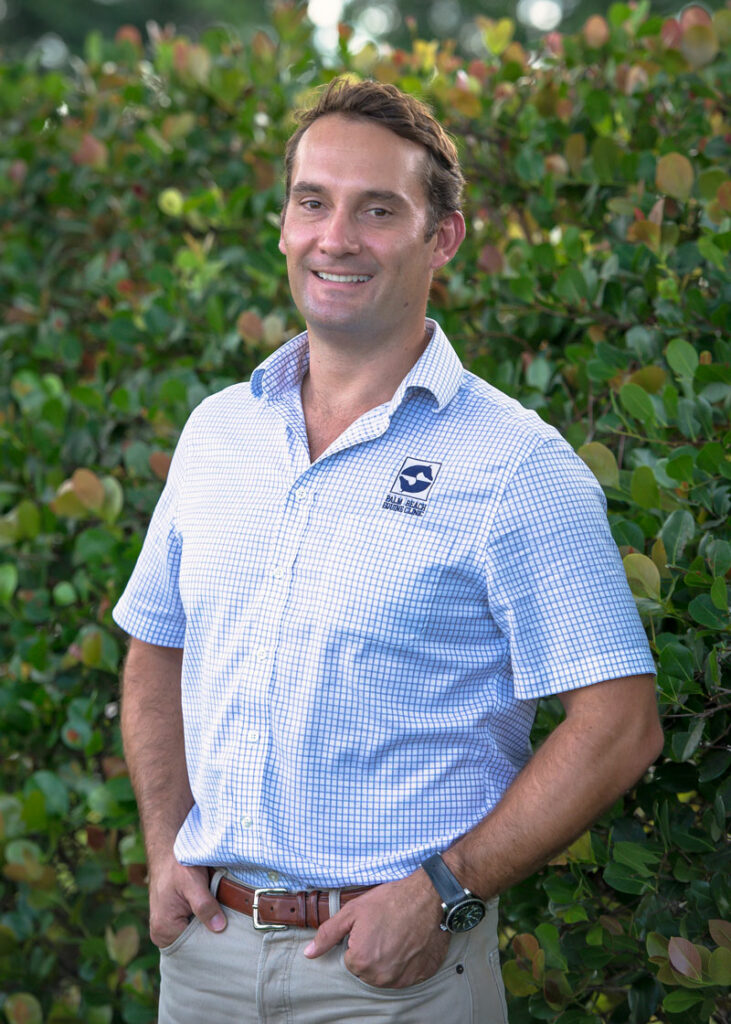
Dr. Wheeler graduated from the Royal Veterinary College in London in 2002. He spent his first two years of practice as an intern at Greenwood, Ellis and Partners in Newmarket, England, where he worked in a referral center specializing in the treatment of Thoroughbred racehorses and Sport Horses. Dr. Wheeler moved to Palm Beach Equine Clinic in 2005 and became a partner in 2009. Dr. Wheeler’s clients include Jumpers, Dressage and Polo and he is licensed to practice in FL, KY, NC and NY and also the UK and Europe.
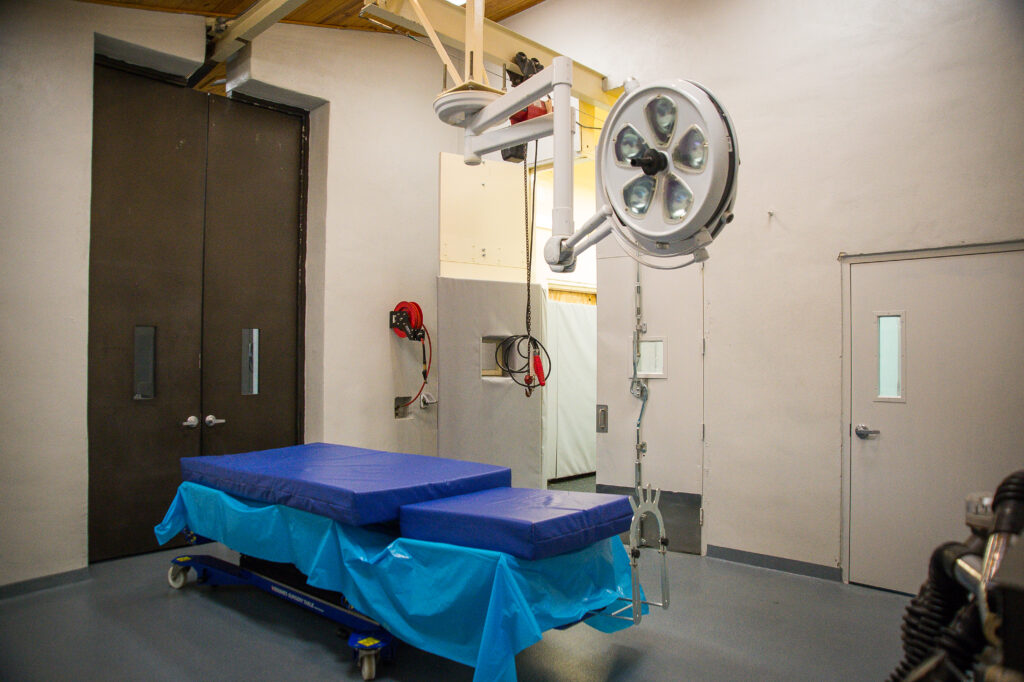
Best in Class Veterinary Team
Palm Beach Equine Clinic is renowned for its full-service surgical center and intensive care hospital located in the heart of Wellington, Florida. Board-certified surgeons, primary care veterinarians and hospital technicians are scheduled 24 hours a day, 365 days a year to treat, monitor and care for critical cases. With world-class veterinarians and a full staff of highly trained technicians, both clients and patients of Palm Beach Equine Clinic are in the best hands possible for equine emergency care and beyond.
Surgical Facilities for Equine Emergency Care and Beyond
Palm Beach Equine’s surgical suite and staff is prepared for all kinds of 24-hour equine emergency care. The large team of 24 veterinarians includes three board-certified surgeons who rotate on-call duties for all equine emergency care. This aids Palm Beach Equine Clinic veterinarians and all of Southeast Florida with the ability to quickly treat equine emergencies requiring surgical assistance. The state of the art intensive care hospital is equipped with digital video cameras for the clinicians to easily monitor their patients from any location, at any time.
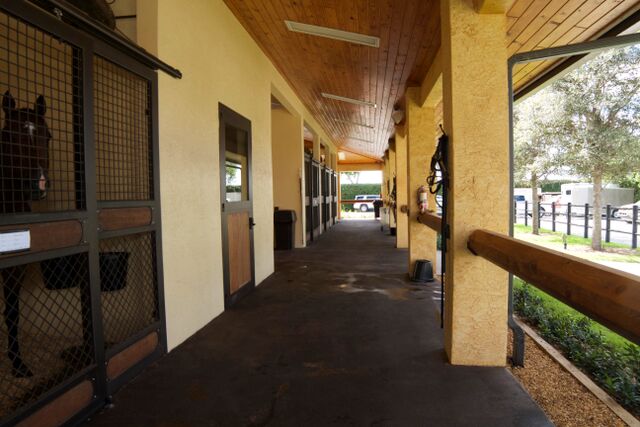
Laboratory and Diagnostic Capabilities
Palm Beach Equine Clinic has the most advanced imaging technologies available on-site, including Magnetic Resonance Imaging (MRI), Nuclear Scintigraphy (Bone Scan), Ultrasonography, Digital Radiography and Endoscopy. Palm Beach Equine Clinic has a board-certified radiologist on-site to interpret images and assist in precise diagnosis. Palm Beach Equin Clinic is equipped with a full-service laboratory with hematology, chemistry, and microbiology equipment to quickly help with the evaluation of each case.
For more information on Palm Beach Equine Clinic or in case of an equine emergency, please call (561) 793-1599 to contact an on-call veterinarian.
A leader in sport horse medicine, Palm Beach Equine Clinic is always on the forefront of advances in regenerative therapy. One treatment that has become widely used in modern equine medicine is the use of Platelet Rich Plasma (PRP) for soft tissue injuries.
Platelets are very small blood cells that are a crucial part of our body. Platelets are an integral part of the blood clotting process to stop hemorrhage from any wound. Platelets also contain Growth Factors – the elements that aid in healing and stimulate specified tissue to heal at an increased rate.
In order to treat your horse with Platelet Rich Plasma, the veterinarians at Palm Beach Equine Clinic are able to take a sample of the horse’s blood and concentrate the platelets in a high-speed centrifuge using procedures, filters, and equipment. The concentrated platelet rich sample is injected back into your horse at the specific area of injury in a sterile procedure usually ultrasound-guided.
A sample is pulled from the bloodstream in the exact method one would draw blood from the jugular vein. The pulled blood sample is then processed in the sterile laboratory on site at Palm Beach Equine Clinic to extract and concentrate the platelets in a condensed sample. The prepared PRP sample is injected into a tendon lesion or ligament or even into the joint space to provide natural growth factors to increase the tendon rate of healing and aid in the repair of the injury.
PRP treatment has had repeated great success in tendon and suspensory ligament injuries and is increasingly used in the treatment of intra-articular joint injuries. It can be very helpful to help repair cartilage and soft tissue injuries within the joint space.
Palm Beach Equine Clinic prides itself on continuing to remain State of the Art on continuing medical advancements. Along with PRP, Stem Cells are also frequently used with PRP. The growth Factors are combined with regenerative Progenitor Cells. This cutting edge therapy is part of a continually advancing field that has made exciting developments in both human and equine sports medicine.
Palm Beach Equine Clinic veterinarian Dr. Richard Wheeler considers PRP to be one of the best-studied regenerative therapies offered.
“The nice thing about PRP is that you are using the body’s own healing mechanisms,” Dr. Wheeler explained. “It is very natural; it is all endogenous. You are using the horse’s own cells to repair injuries, and it can be really useful.”
“Regenerative medicine is a very explosive field at the moment,” Dr. Wheeler continued. “We are improving and finding out new things all of the time. PRP is being used extensively in human medicine as well. It has good science behind it, so I think it will stand the test of time.”
Every regenerative therapy program is different and it is important to consult your veterinarian and understand the options and specific applications for each treatment. To find out if PRP therapy is right for your horse, contact Palm Beach Equine Clinic for more information at 561 793 1599.
Battling Equine Summer Sores
Summertime is here and along with the summer months in Florida comes humidity and an increase in the fly population. Unfortunately for horse owners, an increase in the fly population creates many problems. One major problem that seems intensify every year is equine summer sores, or medically known as Habronemiasis. Equine summers sores are lesions on the skin caused by worm larvae from the horse’s stomach.
Easy Culprit: Flies
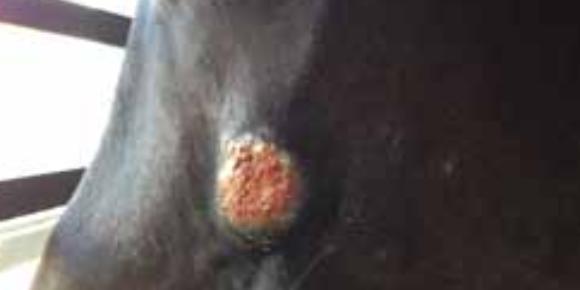
How does the stomach worm larvae end up as a skin lesion? One simple answer is from a fly. The stable fly is a host for these parasites. The worms in the horse’s stomach produce eggs that pass through the digestive tract, which end up in the horse’s manure. After that, the eggs then hatch to develop larvae that attach to the blades of grass.
Chain Reaction
The fly carries the larvae on its extremities and is attracted to mucous membranes or open wounds on the horse. Next, the larvae infect the open wound or a mucous membrane such as the eye or prepuce. This creates a type of allergic reaction within the immune system causing inflammation, discharge, and the production of granulation tissue infected with larvae. One way to tell if you are dealing with a summer sore is the granulation tissue contains small yellow rice like larvae within the skin and a mucopurulent discharge associated with the wound.
Summer Sore Prevention
The best way to avoid equine summer sores is to prevent them. Fly control, proper wound care, and most importantly an effective de-worming program. Habronema species are the source of summer sores. Please call Palm Beach Equine Clinic and discuss with one of our veterinarians a proper de-worming program.
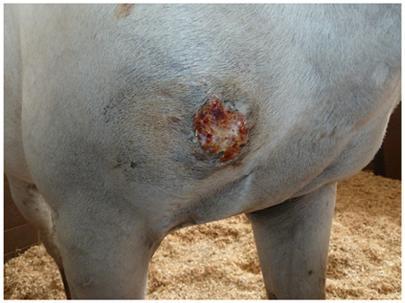
Proper treatment of the lesion is extremely important. Delaying initial treatment may result in an increased cost. Delaying treatment may require surgical excision of the granulation tissue and possible skin grafting. Severe Habronemiasis of the male horse’s sheath may require reconstructive surgery of the prepuce and/or urethra.
Contact Palm Beach Equine Clinic to Treat Equine Summer Sores
At the first sign of an equine summer sore, contact your veterinarian at Palm Beach Equine Clinic at 561-793-1599.
Dr. Bob Brusie Talks About Stem Cell
As the leading equine veterinary hospital in the southeast, Palm Beach Equine Clinic is proud to bring our clients videos on specific topics of interest. This video features equine reproduction specialist, Dr. Robert “Bob“ Smith discussing Artificial Insemination for horses.
About Dr. Robert Smith
Dr. Smith is a 1975 graduate of the University of Georgia who lives in Royal Palm Beach and has been practicing for 30 years. Dr. Smith is a renowned veterinarian who specializes in advanced reproductive services. He advises and consults with clients on advanced fertility techniques, such as embryo transfers, and oversees a complete frozen semen program, from collection to storage and worldwide distribution.
